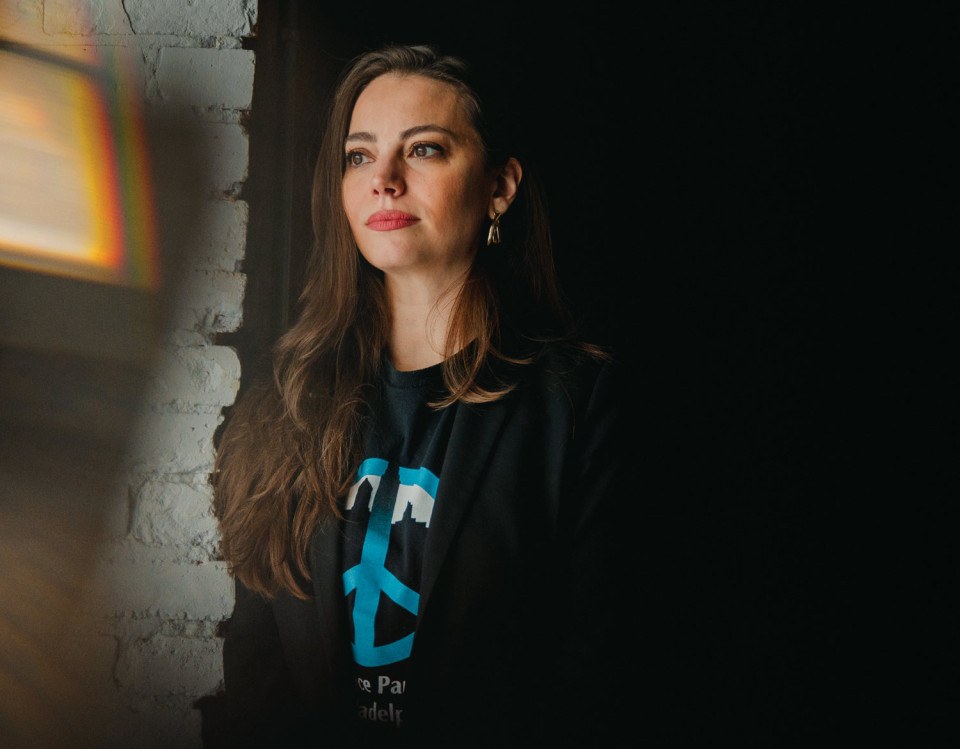How Supporting Those Left Behind by Gun Violence Can Help Break the Cycle
Natasha Danielá de Lima McGlynn, executive director of Anti-Violence Partnership of Philadelphia, on the vital role of victims’ services

Natasha Danielá de Lima McGlynn, director of Anti-Violence Partnership / Photograph by Hannah Yoon
Natasha Danielá de Lima McGlynn knows too well that those who lose a loved one to violence rarely get the help and support they need. She’s been there. In September 2018, when she was living in Washington, D.C., and working at the Federal Reserve, her best friend, Wendy Martinez, was murdered while on an evening jog — stabbed to death by a random stranger.
She brings this experience to her role as the first Latina executive director of the victim-service agency Anti-Violence Partnership of Philadelphia.
“This was a crucial moment in my life. It changed everything for me,” says de Lima McGlynn, who had moved to D.C. in 2009 after growing up in Bay Ridge, Brooklyn, a daughter adopted from Brazil by a Brazilian immigrant and an Irish-Italian lawyer.
As soon as she got the news, de Lima McGlynn went to Wendy’s apartment with other friends to organize a vigil. “But really, it was just a blur. I was very, very close with her,” she says, shaking her head at the memory. For Wendy’s friends, de Lima McGlynn says, there wasn’t any way to truly process her death.
For her part, she mostly struggled, alone and depressed. “I was broken,” she says — until she moved to Philadelphia in early 2019 to pursue her master’s in public administration at Penn. “The city saved me,” she says. She worked on her capstone research project, a study of the increase in violence against women in public spaces, dedicating her work to Wendy’s memory. And she joined the board of directors of the Anti-Violence Partnership (AVP) to work with communities to reduce violence. She impressed her fellow board members with her passion to help others and was named executive director in June 2021.
“Natasha has tremendous vision for the organization and its growth,” says Myra Maxwell, executive director of Victim Support Services at the Philadelphia District Attorney’s office, which refers crime victims to AVP for counseling and therapy.
The organization — one of the city’s seven victim-services organizations — was born of tabloid tragedy, established in 1983 by Deborah Spungen, the mother of Nancy Spungen, after Nancy was murdered by her boyfriend, Sid Vicious, the bassist for British punk band the Sex Pistols. It’s the dedicated victim-services provider for West and Southwest Philadelphia; courts, schools, and the medical examiner’s office all refer clients to AVP for therapy and grief counseling.
Philadelphia has endured staggering increases in gun violence in recent years. In 2022, there were 516 gun homicides in the city; in 2021, 562 gun homicides devastated entire neighborhoods. Last year, there were 300 people on the organization’s waiting list for grief and counseling services. “We still don’t truly understand the scale and magnitude of violence in this city and how it’s affecting people,” de Lima McGlynn says.
To meet the rising need, she plans on expanding services. She wants all the overlooked friends, nephews, cousins and others who’ve lost someone to violence to get counseling or join therapy groups or just be able to talk to someone who’s been through similar trauma. Casting a wider net to all community members is essential to reducing the cycle of violence, de Lima McGlynn says of AVP’s expanded outreach. She’s increased data collection as well, to better pinpoint how to direct the organization’s resources, policies and legislation.
One of the AVP’s signature programs, Youth Violence Outreach, focuses on schools, to help children who have witnessed or known someone affected by gun violence. Therapists are meeting kids in a trusted place where they can get the services — and, hopefully, the skills — to stay away from violence as they grow into adults. In Kensington, an 11th-grader at Kensington Health Sciences Academy receives group therapy and support services and is part of the Violence Prevention Group; a ninth-grade boy at a charter school gets support for trauma therapy. There were 2,253 shootings in the city last year.
It’s a lot for a city, let alone one organization, to process, but de Lima McGlynn is approaching the problem strategically. AVP has partnered with Penn’s Netter Center for Community Partnerships to work in two high schools and will add four more this spring. And de Lima McGlynn has moved AVP’s offices from Fairmount to West Philadelphia to be closer to the communities it serves. She spearheaded a report on the costs of crime-scene clean-up — an enormous, “inhumane” administrative issue that shifts the burden onto crime victims, she says — and testified on the burden to Philadelphia’s City Council. She sits on the Victim Services Advisory committee for the Pennsylvania Commission to advise on victim needs.
There’s a lot to do with limited funds and staff. But de Lima McGlynn says, “This isn’t about me. It’s about the violence — and who it hurts — which is so much bigger.”
>> Click here to return to “6 Philadelphians With Promising Approaches to Gun Violence Prevention”
Published as “The Survivors’ Advocate” in the March 2023 issue of Philadelphia magazine. The print version of this story misstated Natasha Danielá de Lima McGlynn’s cultural identity. She was adopted from Brazil by her parents. The Anti-Violence Partnership of Philadelphia is the dedicated victim-services provider for West Philadelphia as well as Southwest Philadelphia.


